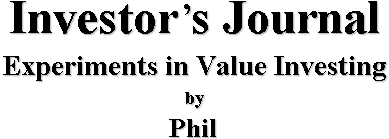Home
Previous
Next
March, 2004: 8 16

Disclaimer - IMPORTANT - Read this first!
| Investor's Journal is a diary focused strictly on investments and personal finance issues, primarily from a contrarian and retiree point of view. Follow along with an average guy's failures and successes as he learns, by trial and error, the fine art of value investing. |
3/8/04-I purchased additional shares of Duckwall-Alco Stores, Inc. (DUCK), at $14.50 today, for both the Essential Value Portfolio (EVP) and our overall nest egg.
DUCK has a price to book value ratio of 0.59 and debt to equity of 0.28. It thus qualifies as a Benjamin Graham bargain asset. In addition, it has a low price to sales ratio of only 0.15, a nano-cap market capitalization of $61 million, and a below the market averages price to earnings ratio of 10.8.
The new Duckwall-Alco EVP investment, with commission, came to $2524, taken from the portfolio's cash reserves. The total investment in our EVP open positions (now representing 18 purchases) is $45,952. The portfolio cash balance after this transaction is $11,651.
Since the 2/23/04 entry, there has been no change in our EVP closed position analysis.
The overall Essential Value Portfolio investment has been $53,970. With its current value of $60,977, the EVP has a total return since the 8/18/03 inception of $7007, or 13.0%.
Assuming we have minimal or zero margin, I feel comfortable becoming a part-owner in a business at any time I can do so when there is low company debt, a price to book ratio of 0.59 or below, low P/E, low P/S, and (when there is a dividend) the corporation has a payout ratio of .5 or below.
At worst, I'll hold shares in such an investment, indefinitely if necessary, until the price reaches or exceeds the per share book value. Occasionally, though, the company will be bought out at a higher share price or its fundamentals will improve faster than its market value, so the asset may be profitably retained at less than its book value while both its price and its intrinsic worth continue to advance.
3/16/04-Following the latest market sell-off, yesterday, the S & P 500 has been down .7% thus far for the year, while our nest egg remains at least positive, up 3.1% for 2004, even after our excess of expenses (not offset by ordinary income), which averages just under $2500 a month. If our excess expenses were made part of the calculation, the nest egg is up 4.0% this year, through 3/15/04.
Despite the recent equities bear market, the correction we have been experiencing, and our net expenses being subtracted before comparing the results, we have consistently beaten the S & P 500 for the last several years. For instance, from 12/31/01 to the close of business 3/15/04, the nest egg is up 13.7% after all our expenses, but the S & P 500 over the same period is down 3.8%, a compound annual return advantage averaging 7.6% for our nest egg over the S & P 500 Index, since my retirement at the end of 2001. If our excess expenses (taken from the nest egg) over ordinary income were factored in, the nest egg's record would be even more significant, a compound annual return advantage averaging over 12%.
The major factor in our favor is that I take a value or contrarian approach to investing.
The effect is the same as if I had a part-time job as a portfolio manager, for which I were compensated with a hefty fee. If I can fairly consistently sustain at least a 5% advantage over the total return of just having all our assets in a S & P 500 Index fund, and we can live on that 5% (plus our misc. other income), then the nest egg can gradually keep going up at the S & P 500 rate while we also enjoy an extra $30,000 or more (lately a lot more) added to each year's budget, pretty good for just doing what I enjoy!
To help with stock and mutual fund decisions, I rely on several excellent resources:
|
Value Line
Outstanding Investor Digest AAII MSN Money |
Disclaimer and Disclosure Statement
Neither I nor Investor's Journal will be responsible for losses by anyone who obtained ideas from this site.
This diary is intended for personal interest and general information only. You are advised to do your own research (as well as to consult highly compensated professionals) before spending money on anything.
I know of no reason anyone should take my financial musings seriously. At best I am a dedicated amateur providing a bit of investment-related insight and entertainment, at worst an amusing diversion.
My wife, Fran, and I may at times own shares of some of the assets mentioned here. But neither of us receive any benefit from reference to them, unless you count the mutual misery when we get it wrong, or the opportunity to gloat when we get it right.